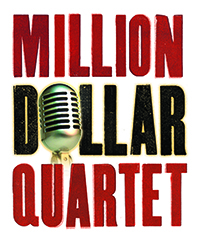Review: Million Dollar Quartet by Zach Theatre
by David Glen Robinson
Musicals are what Zach Theatre does best under Producing Artistic Director Dave Steakley, and Million Dollar Quartet shines near the top of the rankings. The show, with a book by Colin Escott and Floyd Mutrux, is a top-shelf literary and musical property, and Zach Theatre’s production of it realizes all its potential. The audience, of course, receives full value for its ticket purchases. The show is highly recommended for audiences of all ages.
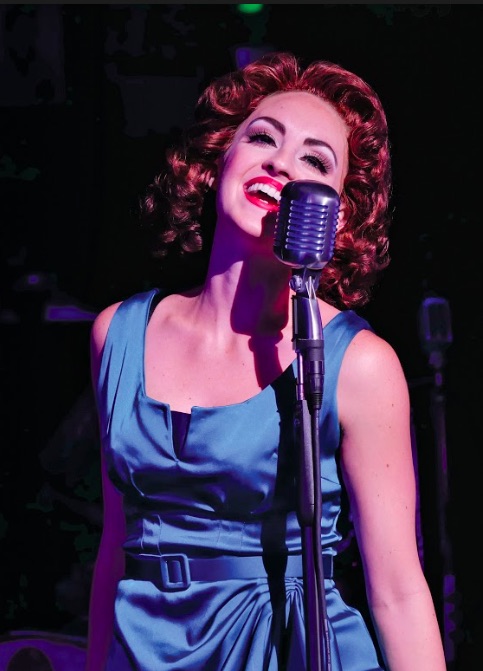 The premise of the story is one day in the life of Sun Records in Memphis, Tennessee. The date was December 4, 1956, a busy day of recording music for owner Sam Phillips. Accounts vary, but late in the day, Elvis Presley, Johnny Cash, Carl Perkins, and Jerry Lee Lewis were present in the same room and held a jam session. There is at least one photograph to confirm that, plus the recordings Phillips made of the session.The four artists never assembled again and did not record anything else together as a quartet, hence the irony of the title.
The premise of the story is one day in the life of Sun Records in Memphis, Tennessee. The date was December 4, 1956, a busy day of recording music for owner Sam Phillips. Accounts vary, but late in the day, Elvis Presley, Johnny Cash, Carl Perkins, and Jerry Lee Lewis were present in the same room and held a jam session. There is at least one photograph to confirm that, plus the recordings Phillips made of the session.The four artists never assembled again and did not record anything else together as a quartet, hence the irony of the title.
The premise is an excuse for the music. The show gives us twenty-four classic rockabilly and rock-and-roll songs along with a few country-and-western and gospel songs; the uncategorizable “Fever, “ sung in torch mode by Emily Farr, is thrown in for good measure. The complex sound design created by Craig Brock supported the musicians on stage with nary a snap, crackle, or pop.
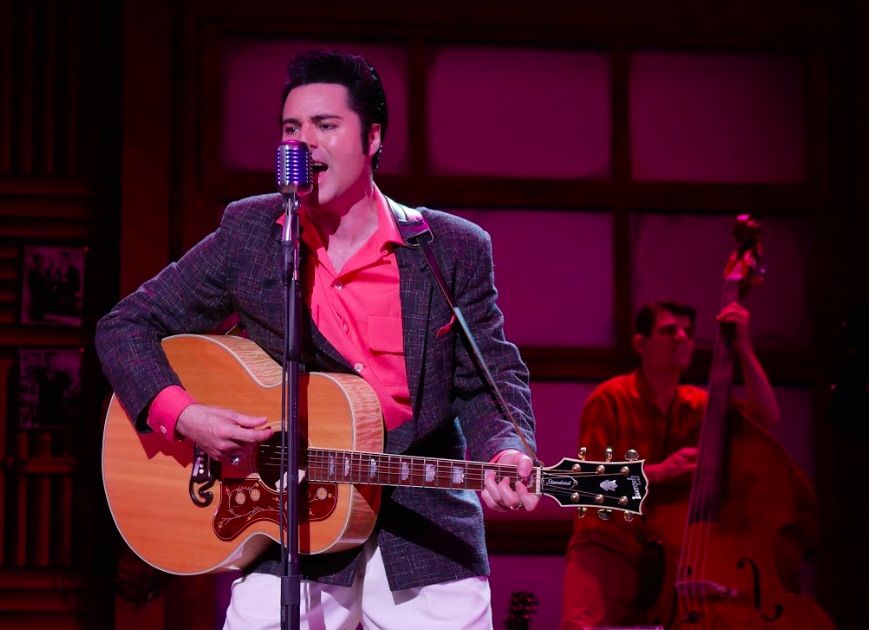
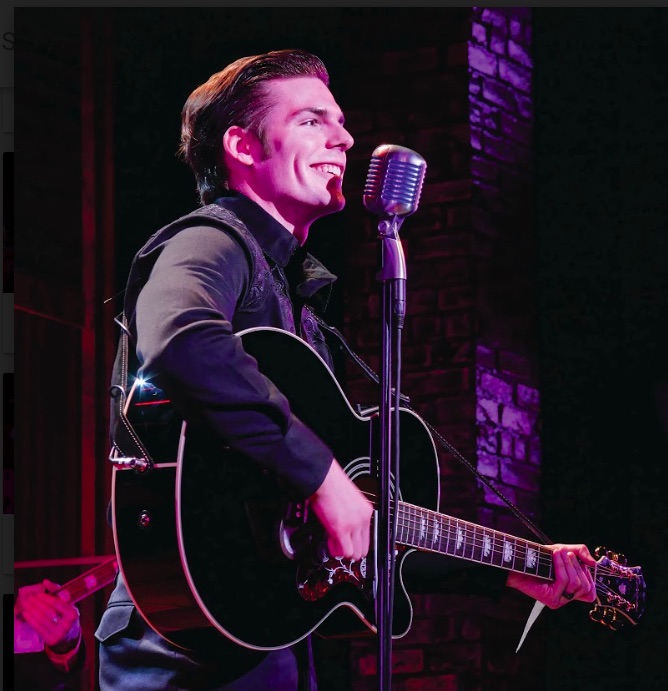
Music Director Allen Robertson culled national talent for his performers, and they all seem to be quadruple threats—acting, dancing, singing, and playing instruments. Some of them are specialists in Million Dollar Quartet, having performed it multiple times in other parts of the country. The mono-monickered Cole as Elvis drew shouts from the crowd on his first entrance. He had it from the walk.The immortal hair and black-and-white saddle shoes merely polished the image.His voice and singing brought us startlingly to Elvis Lives!
Of all the voices, Corbin Mayer’s take on Johnny Cash came closest musically to the artist and brought back the strongest memories of the Man in Black and the life lessons the taught us in song. In a brief post-show interview, Mr. Mayer acknowledged that he “did some work” on Cash’s voice and appreciated the recognition for it. Cash sang slightly flat, more so toward the end of his career. He dropped into the bass register frequently, this reviewer believes, to gain or keep sonority. In any case, Corbin Mayer captures this unique voice with exquisite results.Such in-depth dedication to a role is deserving of the highest praise.
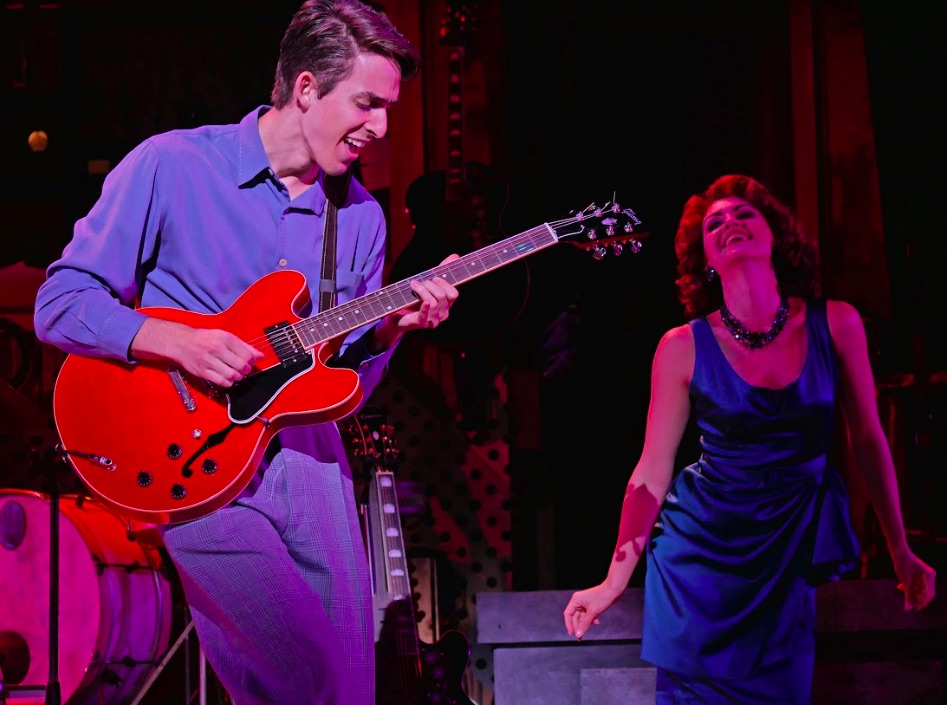
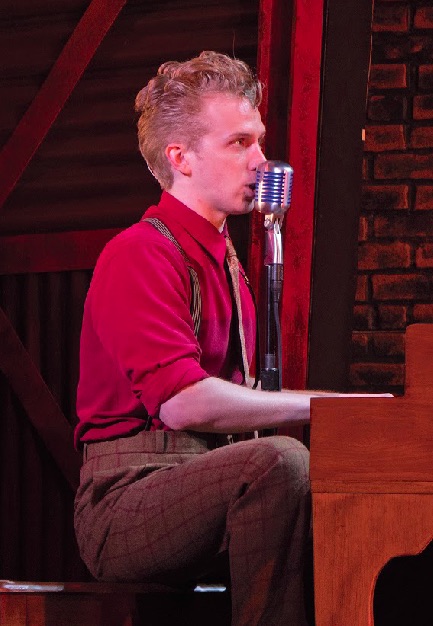 The crowd-pleaser is Gavin Rohrer as Jerry Lee Lewis. Rohrer plays Lewis’s difficult personality for comedy.What sends the stage performance over the top, however, is Lewis’s flaming passion for his piano. Rohrer leaped at the instrument, his fingers positioned for the chords while apparently ten feet in the air, and then landed on the keys with laser-guided accuracy to drive his songs forward.His triumph came at the end of the post-play concert with “Whole Lotta Shakin’ Goin’ On.”
The crowd-pleaser is Gavin Rohrer as Jerry Lee Lewis. Rohrer plays Lewis’s difficult personality for comedy.What sends the stage performance over the top, however, is Lewis’s flaming passion for his piano. Rohrer leaped at the instrument, his fingers positioned for the chords while apparently ten feet in the air, and then landed on the keys with laser-guided accuracy to drive his songs forward.His triumph came at the end of the post-play concert with “Whole Lotta Shakin’ Goin’ On.”
The musical high points were numerous, as one would expect of rockabilly. Billy Cohen’s Carl Perkins played foundational guitar, showing us where the musical form came from, with a sincere nod to Chuck Berry. The eternally anonymous studio musicians were played with incredible energy by Adam Egizi and Zachary Yanez. Even Jeff Jeffers’ Sam Phillips got into the act with his harmonica, and Emily Farr, as Elvis’ fictional girlfriend Dyanne, contributed a wonderful voice and voluptuous dance to the ensemble. Altogether, these cast members are the insayn basterdz of performance, in the very best sense.
The play compresses time, as it must, but brings together a lot of rockabilly lore, much of which centered on Sun Records.Phillips hit a financial low in 1955, and to his regret he sold Elvis’ contract to RCA Records for $40,000. That, however, saved the company and the careers of Perkins, Cash, and Lewis. At the time of our legendary session, Elvis had come back to ask Phillips to take a job with RCA as Elvis’ musical manager, and indeed RCA had made the offer. Elvis really trusted no one but Phillips and sensed keenly that everyone at RCA wanted to exploit him for their own gain. Presley’s manager Col. Tom Parker was no help; he believed rock ‘n' roll was the passing obsession of teenage girls, and soon nobody would sell a record.That’s why he pushed Elvis into movies and other endeavors. The Sun Records artists insisted that Parker was trying to turn Elvis into a “sideshow attraction.” All of Phillips’ artists sought his tutelage. The play reports as true Phillips’ statement of principle to new artists: “If you’re not doing something different, you’re not doing anything.” He is credited with helping Elvis and the others find their authentic voices.
The characters report with shame the tale that Chuck Berry was ordered by a record company to change the title and some of the lyrics of a song from “Brown-skinned Handsome Man” to “Brown-eyed Handsome Man.” They were awash in a world of racism, and they knew it.
The most lurid stories belong to Jerry Lee Lewis. He tells stories with pride others would tell with embarrassment. He was married twice before the age of 21, to the second one before he got rid of the first one.He states proudly that his cousin Jimmy Swaggart is an evangelist. The play does not report that he married a thirteen year-old first cousin. Perhaps that came much later? The play enacts the confirmed confrontation between Lewis and Elvis when Lewis declared that rock ‘n' roll was of the Devil, and those who played it were doing the Devil’s handiwork. GIven the debauchery that surrounds the ecstasy of the music, it followed that rock ‘n rollers were beyond redemption and ultimately to be pitched into Hell. Elvis had such fears, and Lewis seemed to feed them, to Elvis’s great discomfort.
Perkins and Cash were coming to the ends of their contracts with Sun, and both decided to move to Capitol records, complaining that Phillips was no good at distribution. Phillips decided not to follow Elvis to RCA and not to close the record company, and that left him with Lewis as an emerging artist. Thus there was only one night together and separation in many different directions.
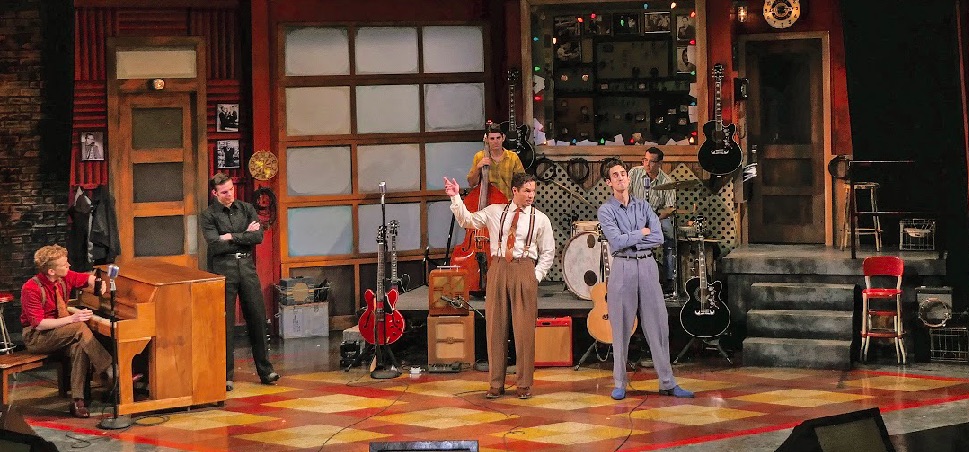
The set design is brilliant, and huge credit goes to Adam Koch and Lighting Designer Matt Webb. The place is a fantasy reimagining of the recording room of Sun Records.No doubt in reality it was a drab place decked out in sound buffering tiles décor, but Koch and Webb decided to tickle our synthesthetic sense with their version. The set, open to view to the audience throughout, looks like how ice cream tastes. An unusual opening lighting set is a rich combination of sienna, fuchsia, orange, and fluorescent lime green.If that sounds icky, no worries, it tastes great. The method in Koch’s and Webb’s madness is to help ignite the aura of myth around the story. The four rockabilly gods of the tale today flicker in and out of myth and reality, except for Elvis, whose memory may now reside strictly in the province of myth. The set establishes a context of being partly here, partly in a land of fantasy, and its functionality in both worlds is superb.
Zach Theatre has fulfilled the promise of Million Dollar Quartet with its slick and well-funded production. It’s puzzling therefore that the cover photo on the glossy season program for the theatre is reversed. The character names in the credits read opposite from their positions in the photo, and the guitarists strum with their left hands, not usually the case. It's a tiny glitch, though, and one that should not keep anyone out of the theatre.
Million Dollar Quartet runs from July 26 to September 3, 2017 at the Topfer Theatre in the Zac Theatre complex.
Million Dollar Quartet
by Floyd Mutrux and Colin Escot
Zach Theatre
July 26 - September 03, 2017
Tickets start at $25 and are available online at zachtheatre.org, by phone at 512-476-0541 x1, or in person at the ZACH Theatre Box Office, in the Topfer Theatre, 202 South Lamar Blvd. (corner of Riverside Drive and South Lamar Blvd.) Monday through Saturday, 12 – 5 p.m. ZACH Theatre is wheelchair accessible. Discounts are available for groups of 8 or more. Student Rush Tickets are $18 one hour before show time (with valid ID).
